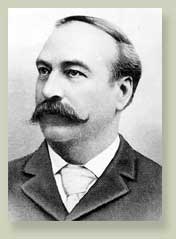Territorial Timeline

President Chester A. Arthur appointed Watson C. Squire governor
Watson C. Squire served as governor at a time when Washington Territory was torn with agitation against the Chinese.
During the railroad-building era, Chinese laborers were welcomed. But when the main railroad projects finished, many Chinese were out of work. Some white residents were concerned their own jobs were threatened by the Chinese who would often work harder and for less money.
In Washington the agitation reached a climax in the winter of 1885-86 when all of the Chinese residents of Tacoma were driven out and serious anti-Chinese riots took place in Seattle. Governor Squire tried to maintain order by declaring martial law and calling out the Territorial Militia. Soon after President Cleveland issued a proclamation calling for the restoration of order, and when that was ignored, Federal troops were ordered into Seattle. In the end, most of the Chinese were expelled, put on a ship and sent to San Francisco.
Since territories were administered by the U.S. Department of Interior, one of the duties of a territorial governor was to send detailed reports to the Secretary of the Interior regarding conditions and events in the territory. This was partly to show how the territory was progressing towards eligibility for Statehood, so Squire, a strong advocate of State for Washington, was careful to report on the desirability of admitting Washington to the Union. In urging Congress to act, he wrote: "This is the only political division of the continuous seaboard of the United States which remains in a territorial condition. Its present and prospective maritime relations with the world entitle it to political importance and consideration."
After Squire completed his term as territorial governor, he continued to agitate for Statehood for Washington, heading up a convention in Ellensburg in 1889 which sent Congress resolutions which again spelled out the reasons why Washington should be admitted to the Union as a state. After Washington finally became a state in 1889, Squire was twice elected to the U.S. Senate, representing Washington. After he retired from political life he practiced law in Seattle. He died in 1926.